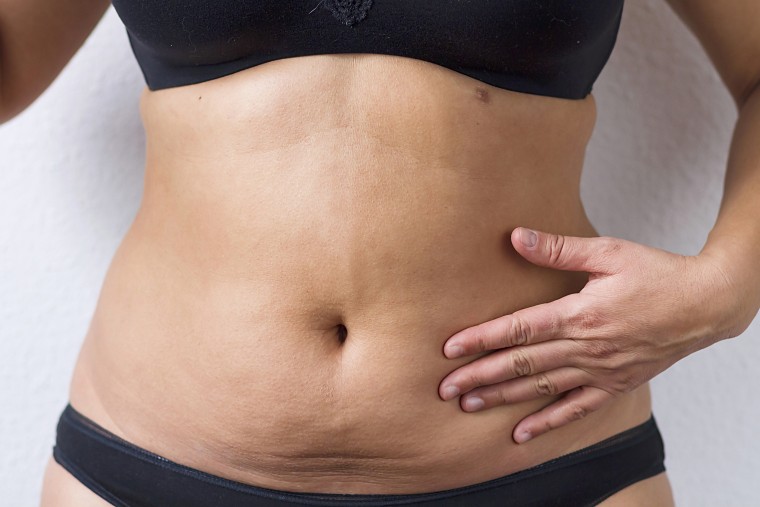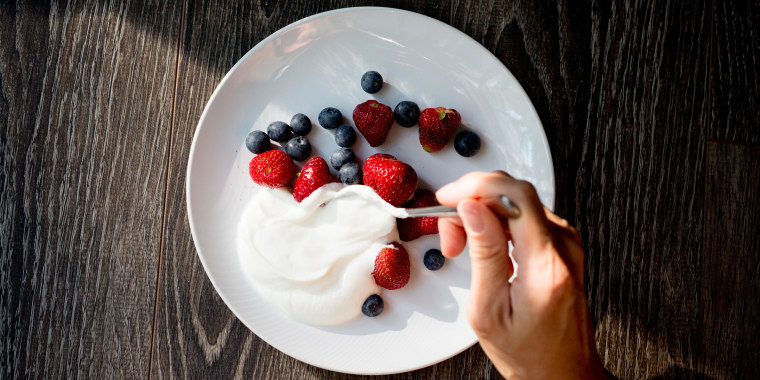TikTok is obsessed with gut health, so much so that the hashtag #guttok has almost 728 million views on the app. Many influencers say good gut health is the key to a flat belly, a mood boost and so much more. But how many of these claims are actually rooted in science? Will drinking lemon juice and ginger really make as much of a difference as some creators claim?
We chatted with two registered dietitians to determine how to decipher fact from fiction on TikTok and whether or not gut health is even that big of a deal.

Why is gut health trending on TikTok?
If you thought #guttok was big, well, the hashtag #guthealth has 3 billion (yes, with a B) views on TikTok. Why the sudden fascination with what’s going on in your gut? The likely answer to this question is marketing — many of these claims are shocking and influencers have quick fixes aplenty.
Oodles of the most popular gut health videos depict drastic before and after photos with bloated bellies transformed into flat and toned abs. In other words, “gut health” may be a new way of marketing weight loss tips, which go hand-in-hand with crazy fad diets.
Rather than counting calories and drinking green juices to reduce belly fat, some TikTokers seem to promote using coconut oil and ginger shots to beat the bloat. These simple elixirs appeal to many, but fixing gastrointestinal (GI) issues isn’t that easy. “The gut is extremely complex — scientists are just at the tip of the iceberg in terms of figuring out how health and our guts are linked,” says Abby Langer, registered dietitian and author of Good Food, Bad Diet.
What’s worse, many people are fooled by some TikTokers who label themselves as “gut health scientists” or “gut health coaches”. “These are terms created by everyday people — some with zero medical training and others with some medical/nutrition background — to make them appear like they are 'experts' or 'gut health gurus,'" says Kate Scarlata, registered dietitian and author of The Low FODMAP Diet Step by Step.
So how to do your find the information you need to promote a healthy gut? “Your best bet to obtain credible information about GI symptom management or general guidance for gut health is to talk to a registered dietitian or a gastroenterologist — particularly one that has been following the research on how the gut microbiome, nutrition and lifestyle impact health and disease,” says Scarlata.
Don’t fall for these #guthealth claims
These are a few gut health situations that may be popping up on your feed. If you see these claims, keep scrolling.
“Do this to eliminate bloating!”
A video that has over 3 million views claims that drinking olive oil every day will reduce bloating, regulate the menstrual cycle and clear up acne. There isn’t any science linking olive oil to bloating, and the video doesn’t go into detail about the amount of olive oil consumed or any reference to whether other fitness or nutritional changes were made, so it's hard to say whether olive oil had anything to do with the benefits detailed.
Experts agree that no one can get flat abs in the blink of an eye — nor is it healthy to try. “Videos of before and after pictures displaying bloated bellies that magically become a 6-pack overnight often suggest a quick fix 'solution' that is unsustainable and encourages disordered eating,” says Scarlata. Langer also adds that it’s very easy to doctor photos and that you shouldn't believe everything you see.
Plus, experiencing regular bloating could be a sign of a legitimate medical condition, like Irritable Bowel Syndrome (IBS), small intestinal bacterial overgrowth (SIBO) or a food intolerance that you need to see a professional in order to diagnose. “If you have consistent bloating accompanied by other symptoms such as diarrhea, constipation, pain, or bleeding, obviously see a doctor,” says Langer.
Anything that claims to “heal the gut”
“Terms like 'fix your gut,' 'heal your gut' or 'get to the root cause of your gut symptoms' are thrown around on social media to bait and hook people that are suffering with GI symptoms, often as a sales tactic,” says Scarlata. Some TikTokers swear by products like probiotic coconut yogurt that "heal your gut."
Curious about whether the yogurt you're eating has probiotics? “Probiotic products should list the genus, species and strain [of bacteria]—these details are required to determine whether a culture in a yogurt is a probiotic or not,” Scaralata says. “Only live microbes that have been shown to offer a health benefit can technically be called a probiotic,” she adds.

Other TikToks claim that "adding ginger to your diet is a great way to naturally support a healthy gut and efficient digestion." But while ginger is certainly delicious, experts say that it may not be a panacea for gut health.“Ginger may help make your stomach feel better if you’re queasy, but in terms of gut health, there’s no compelling research,” says Langer.
Again, there are just no quick fixes to building a healthy gut. Drinking a glass of lemon juice and ginger won’t hurt you unless you have reflux triggered by citrus, but it certainly won’t cure all your ailments.
How to actually promote gut health
Although the misinformation about gut health is everywhere, experts agree that gut health is actually important. Having a healthy gut microbiome can reduce the risk of chronic disease, boost your mood and build a stronger immune system.
Here are some simple and realistic things you can do to nurture your gut health:
Eat fiber
It’s been reported that less than 10% of American adults meet their daily fiber needs. This vital nutrient plays a huge role in overall health. Specifically, prebiotic fiber nourishes the microbes that live in the gut. These microbes go on to produce short-chain fatty acids, which reduce the pH of the colon and play a role in cancer prevention. Plus, fiber helps you poop regularly, which is one of the best ways to prevent bloating. So fill your plate with fiber rich fruits, vegetables, beans, legumes and whole grains at every meal.
Choose probiotic-rich foods
Fermented foods, like sauerkraut, tempeh, yogurt and kimchi, contain live probiotics that feed the healthy microorganisms in the gut. Probiotics have been shown to be beneficial for skin, cholesterol and weight. They are also used as a treatment for diarrhea, inflammatory bowel disease (IBD) and IBS.
Talk to a healthcare professional about any gastrointestinal issues
It may not be pleasant to talk about, but GI issues happen and are often a sign of an underlying condition. If you experience frequent bloating, abdominal pain, constipation or diarrhea, talk to a healthcare professional about your symptoms. Getting to the root cause of your symptoms is a much better solution than trying a quick fix you see on social media.